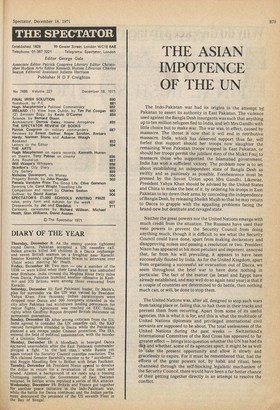THE ASIAN IMPOTENCE OF THE UN
The Indo-Pakistan war had its origins in the attempt b31. Pakistan to assert its authority in East Pakistan. The violence used against the Bangla Desh insurgents was such that anything up to ten million refugees fled to India, and left Mrs Gandhi with little choice but to make war. The war was, in effect, caused by massacre. The threat is now that it will end in retributive massacre. India, which has deserved support thus far, will forfeit that support should her troops now slaughter the remaining West Pakistan troops trapped in East Pakistan, or should her troops permit the jubilant men of the Mukti Fouj to massacre those who supported the Islamabad government. India has won a sufficient victory. The problem now is to set about establishing an independent state of Bangla Desh as swiftly and as painlessly as possible. Forebearance must be pressed by the Soviet Union upon Mrs Gandhi. Likewise, President Yahya Khan should be advised by the United-States and China to make the best of it, by ordering his troops in East Pakistan to lay down their arms, by conceding the independence of Bangla Desh, by releasing Sheikh Mujib so that he may return to Dacca to grapple with the appalling problems facing the brand-new but destitute and ravaged state.
Neither the great powers nor the United Nations emerge with much credit from the situation. The Russians have used their veto powers to prevent the Security Council from doing anything much; though it is difficult to see what the Security Council could have done, apart from making declaratory and disapproving noises and passing a resolution or two. President Nixon has appeared at his most petulant and impotent, annoyed that, far from his will prevailing, it appears to have been successfully flouted by India. As for the United Kingdom, apart from organising a successful air evacuation out of Dacca, we seem throughout the brief war to have done nothing in particular. The fact of the matter (as Israel and Egypt have already established, and may well do so again next year) is that if a couple of countries are determined to do battle, then nothing much can, or will, be done to stop them.
The United Nations was, after all, designed to stop such wars from taking place or, failing this, to halt them in their tracks and prevent them from recurring. Apart from some of its useful agencies, this is what it is for; and this is what the multitude of United Nations diplomats and privileged international civil servants are supposed to be about. The total uselessness of the United Nations during the past weeks — Switzerland's International Committee of the Red Cross has appeared to far greater effect — brings into question whether the UN has had its day and whether, some of its agencies apart, it might be as well to take the present opportunity and allow it slowly and gracelessly to expire. For it must be remembered that, had the efforts of the great powers not, by habit and ritual, been channeled through the self-blocking legalistic mechanism of the Security Council, there would have been a far better chance of their getting together directly in an attempt to resolve the conflict.










































 Previous page
Previous page